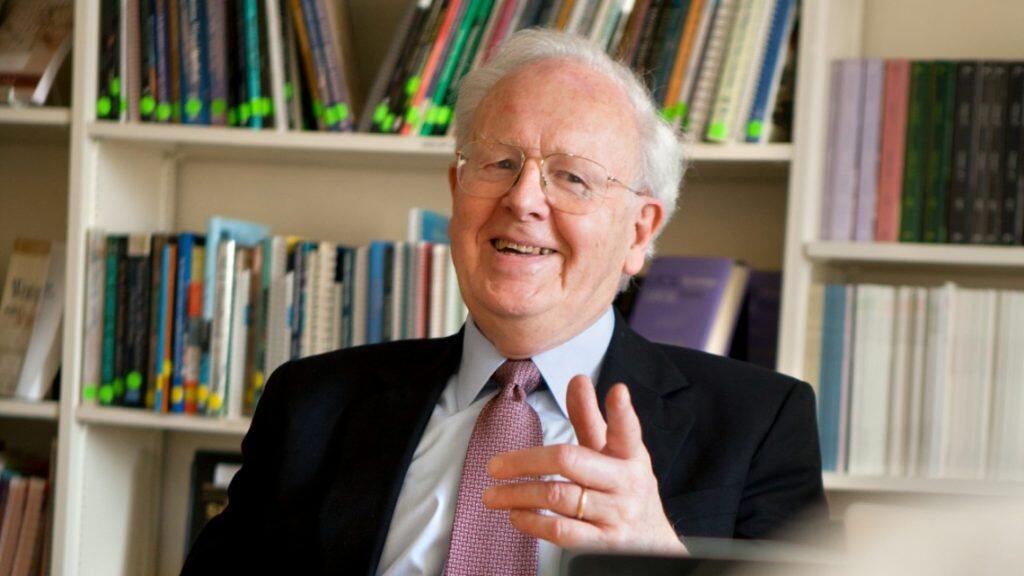

Walter F. LaFeber, the Andrew H. and James S. Tisch Distinguished University Professor Emeritus in the Department of History.
Walter F. LaFeber, the Andrew H. and James S. Tisch Distinguished University Professor Emeritus in the Department of History, in the College of Arts and Sciences – who won ovations from students for classroom lectures and whose mastery of U.S. foreign relations guided historians, political scientists and politicians for decades – died March 9 in Ithaca. He was 87.
“Walter LaFeber was the most distinguished historian of American foreign policy in the last 60 years,” said Glenn Altschuler, Ph.D. ‘76, the Thomas and Dorothy Litwin Professor of American Studies, in Arts and Sciences.


LaFeber wrote and co-authored 20 books, including “The New Empire: An Interpretation of American Expansion, 1860–1898,” (Cornell University Press, 1963); “America, Russia and the Cold War,” (Wiley, 1966); “Inevitable Revolutions: The United States in Central America,” (W. W. Norton & Co., 1983); “The American Age: United States Foreign Policy at Home and Abroad Since 1750,” (W.W. Norton & Company, 1989); and “Michael Jordan and The New Global Capitalism,” (W. W. Norton & Company, 1999).
Many of his students became key figures in U.S. foreign policy, including Stephen Hadley ’69, a former national security adviser; and Eric Edelman ’72, former ambassador to Turkey and undersecretary of defense.
“Great subjects are illuminated best by small dramas,” Altschuler said, quoting Nobelist V.S. Naipaul, at LaFeber’s retirement in 2004. “And so it is with Walt LaFeber. Justly celebrated for his teaching and scholarship, Walt is great, truly great, in my judgment, because of the way he lives each day, unfailingly attentive to students, staff and colleagues, a ‘yes man’ when Cornell asks, and patient, at least outwardly, as his Chicago Cubs disappoint, year in and year out. He is Midwestern mensch – the best thing that’s happened to Cornell in the last half-century.”
Walter Fredrick LaFeber was born Aug. 30, 1933, in Walkerton, Indiana, to Ralph and Helen LaFeber. He graduated from Walkerton High School in 1951. He earned his bachelor’s degree from Hanover College (1955), his master’s degree from Stanford University (1956) and his doctorate from the University of Wisconsin in 1959, when he joined the Cornell faculty as an assistant professor.
He became a professor in 1967, gained the Marie Underhill Noll Professorship in 1968 and was the first-ever recipient of the John M. Clark Teaching Award at Cornell. He was a Guggenheim fellow, a member of the American Academy of Arts and Sciences, lectured at dozens of universities, and appeared frequently on television and radio.
His lectures were events. LaFeber’s two-semester history of U.S. foreign relations course enrolled hundreds of students each semester for decades, according to LaFeber’s former students Andrew Rotter ’75, the Charles A. Dana Professor of History at Colgate University, and Frank Costigliola ’73, professor of history at the University of Connecticut.
That course met midday on Tuesdays, Thursdays and Saturdays, with the Saturday sessions quite crowded, as Cornell students often brought their weekend guests to listen. “He strode to the board and chalked an outline of the day’s lecture,” Rotter and Costigliola recalled. During weekday sections, LaFeber occasionally ate a sandwich during his lecture, pausing to respond to questions graciously and in complete sentences.
At the end of each lecture, delivered without notes, students applauded.
During office hours, dozens of students waited patiently in line in the hallway. The office hours did not end until he’d spoken to each of the students, Altschuler said.
For his farewell lecture in April 2006, nearly 3,000 people filled the historic, gilded Beacon Theater in New York City.
“Walt LaFeber was the professor you never forgot,” said Andrew H. Tisch ’71, the co-chair of Loews Corp. “He was one of those rare teachers who was able to make his subject come alive. He taught a whole half-century of future thought leaders in foreign affairs and diplomacy and helped influence policy in countless administrations. And he loved Cornell.”


The late Joel Silbey, the President White Professor of History Emeritus – himself a San Francisco Giants baseball fan – shared an office in McGraw Hall for a decade with LaFeber, a Cubs fan. They traded friendly barbs, while arguing about politics and sports.
In his campus office, LaFeber kept a portrait of Cubs baseball legend Ernie Banks – signed to him with the salutation, “Keep Going Walt,” and a faux street sign: “Chicago Cubs Fans Parking Only.”
For more than 100 years, Cornell’s president presented the Commencement address. For the U.S. Bicentennial in 1976, President Dale Corson broke with that tradition to offer LaFeber the opportunity to present the address.
“The ideas of 1776, not the war, were truly revolutionary,” LaFeber told the graduates, their families, faculty and staff. “Thus, the fundamental question in American history was posed: Could revolutionary ideas survive in an unrevolutionary society? It has proved to be an explosive question as well.”
The idea of Ezra Cornell and Andrew Dickson White to admit men and women, students of any race, creed, or social class was equally revolutionary, he said. Religious zealots in many of the nations’ other colleges objected to Cornell’s progressive values.
LaFeber told the crowd: “Ezra Cornell understood there is a more dangerous gap between two other cultures, the rich and the poor, and he dedicated his university to closing that gap.”
LaFeber is survived by his wife Sandra Gould, and his children, Scott and Suzanne.
Memorial gifts can be made to the Professor Walter LaFeber Memorial Fund in the College of Arts & Sciences.






































